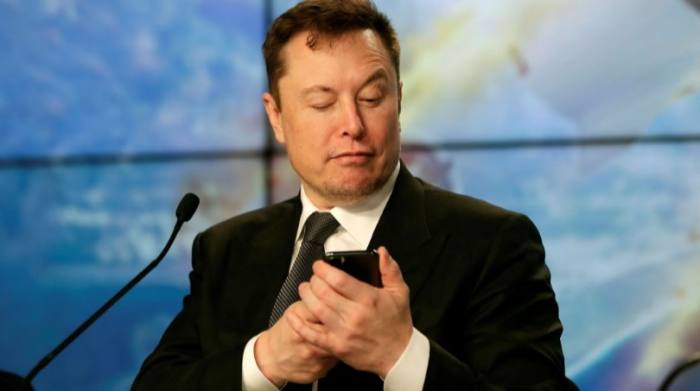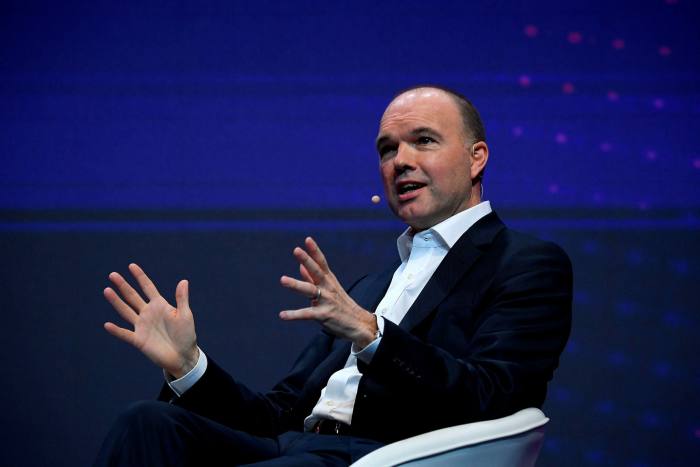Elon’s going to do whatever he wants
One thing to start: The £4.25bn takeover led by US financier Todd Boehly of Chelsea Football Club has hit last-minute problems after the UK government clashed with Russian oligarch Roman Abramovich over the terms.
And one invite to start: Our second DD: Dialogues online event is next week. Join FT columnist Simon Kuper on May 25 at 15.30 BST/10:30 EST for a conversation with journalist David de Jong on his groundbreaking investigation of how the Nazis helped German tycoons make billions from the horrors of the Third Reich. Register for free here.

Welcome to Due Diligence, your briefing on dealmaking, private equity and corporate finance. This article is an on-site version of the newsletter. Sign up here to get the newsletter sent to your inbox every Tuesday to Friday. Get in touch with us anytime: Due.Diligence@ft.com
#NoFilter: the ‘Muskian’ rules for M&A
Twitter is increasingly defending its $44bn deal with Elon Musk on its own platform, an outcome many could have predicted but has caught the Securities and Exchange Commission flat-footed.
In an exchange of tweets with Twitter’s recently-appointed chief executive Parag Agrawal, Musk cast new doubts on his effort to privatise the social media app, despite having signed an ironclad merger agreement to do so just a few weeks ago.
The exchange ended with Musk tweeting a reply with a poop emoji, potentially setting a new low in a live M&A process.
Musk on Monday escalated his threats that an inquiry into fake accounts on the social media platform could “pause” or derail his effort to take the company private, then he said at a conference in Miami that recutting his $54.20 takeover price was “not out of the question.”
Musk’s walking back of his massive leveraged buyout, which includes $13bn in financing raised by a consortium of banks in a matter of days, is an affront to standard procedure. But par for the course for the South African entrepreneur.

He conjured the leveraged buyout of Tesla on Twitter in 2018, claiming he had the funds lined up to take the company private.
The episode left in its wake an ongoing shareholder lawsuit, a $40mn settlement with the SEC and even a mandate for Musk to have his own in-house Twitter legal nanny to ensure he abides by securities laws when posting on the social media platform.
Of course, Musk was little reformed. He repeatedly sent tweets that sent Tesla’s stock moving. But the SEC did not act on Musk. Now it is staring down a regulatory can of worms.
When Musk on Friday tweeted he had put his takeover of Twitter “temporarily on hold” over concerns about the number of spam and fake accounts on the social media platform, markets were quick to react. But corporate takeovers either proceed or are withdrawn. They aren’t just punted on.
Musk’s tweets were widely viewed on Wall Street as an attempt by the billionaire to gain a foothold over Twitter ahead of negotiating a lower price.
These may be the new “Muskian” rules of the road for M&A.
In the absence of a false statement by Musk or clear evidence he was deliberately seeking to push the stock price down, it’s nearly impossible for the SEC to build a market manipulation case against the billionaire, legal experts told the FT.
There is also a vein of thinking that the SEC could have nipped an increasingly volatile situation in the bud many years ago, or even when Musk first arrived on the scene at Twitter.
Musk toed the line of his 2018 settlement without the regulator bringing an action against him. The SEC could have also stopped Musk in his tracks when pursuing Twitter.
After all, Musk filed a passive stake in Twitter on April 4, and within a month had agreed to take over the company. In doing so, he flouted the 10-day grace period for investors who exceed the 5 per cent threshold that triggers disclosure requirements — revealing his 9 per cent stake about three weeks after the March 14 due date.
The SEC’s lack of action has given the world’s richest man free rein to pursue his Twitter takeover ever more erratically on his social media platform of choice.
“Has he become so important to such an important company that the SEC is afraid to do something?” one ex-SEC official asked. “It’s a fair question”.
Vodafone dials-up dealmaking
For months now, Vodafone has had an albatross around its neck: Cevian Capital, Europe’s biggest activist investor.
The Swedish investor has been pushing for the UK telecoms operator to spin off its underperforming units and be more aggressive in driving consolidation in markets such as Spain, Italy and the UK where excessive competition has squeezed prices.
Things are finally looking up. Vodafone has initiated talks with Hong Kong infrastructure conglomerate CK Hutchison to combine its UK operations with Three UK, the FT revealed last week.
And over the weekend, Emirates Telecommunications Group announced that it had acquired a 9.8 per cent stake in Vodafone for about $4.4bn.

Vodafone’s shareholders did not seem too enthused, however.
The UK group’s share price rose less than 2 per cent following the news, a muted reaction compared to the 7 per cent jump in the shares of domestic rival BT back in June of last year, when Franco-Israeli tycoon Patrick Drahi took a stake.
Analysts and investors who spoke with the FT had mixed feelings on whether the latest deal is conducive to its strategy, or if it simply piles on more demands on embattled CEO Nick Read.
“Ultimately it does weaken the hand of an activist a bit, as we now have a strategic investor who has paid a premium to the current share price,” said Jakob Bluestone, an analyst at Credit Suisse. “It allows Vodafone to take its time and reduces pressure to deliver immediate results.”
Others fear the deal only ratchets up the pressure on Read. The UAE group built its position without letting management know it was planning to do so.
It’s clearly expecting a material rise in the share price. As our friends at Lex pointed out: “Even a friend wants bang for their buck when they are spending $4.4bn.”
Can one billionaire clean up crypto?
Sam Bankman-Fried, whose crypto exchange FTX has catapulted him to fame and a $24bn paper fortune, says he plans to give away at least 99 per cent of what he earns as quickly as possible.
“I have about $100,000 in my bank account. And I think we have given away about $100mn so far this year,” he told the FT’s Joshua Oliver over falafel and Impossible fake-meat tacos.
Despite the generous pledge, however, the billionaire — known widely as SBF — has plenty of cash sloshing around to do deals. Last week, the crypto mogul revealed that he’d bought a 7.6 per cent stake in online stock brokerage Robinhood for $648mn.

The announcement sent Robinhood’s stock soaring 25 per cent in after-hours trading but has since retreated. The trading platform has lost steam over the past year following its disappointing public debut.
But it makes sense why the company’s mission to “democratise finance” would appeal to SBF, who holds a similar vision for crypto despite the risks associated with trading risky derivatives products that are banned in several countries.
“You don’t want it to be a way to transfer wealth from the poor to the rich,” he said. “But I think there have been way more examples where there have been people who had very little, who ended up making a lot from crypto and for whom it changed their life.”
One person interested in hearing SBF’s views is Goldman Sachs chief David Solomon.
The Wall Street boss recently met Bankman-Fried in the Caribbean to discuss ways to forge closer ties between the New York investment bank and FTX, as the FT revealed in April.
The trip came less than a year after the crypto billionaire told our colleague Eva Szalay that buying a financial institution such as Goldman would be “not out of the question at all” should it overtake its rival trading platforms.
DD wonders if holding talks with one of Wall Street’s most prestigious banks fits Bankman-Fried’s calls to disrupt an “entrenched elite” of banks and social media companies.
Job moves
-
General Atlantic has appointed former Inditex Group chief and Nestlé board member Pablo Isla as a global senior adviser.
-
Latham & Watkins has hired David Sherman as a partner in its investment funds and private equity practices in New York. He joins from Kirkland & Ellis.
-
Rothschild & Co has hired David Mell as a managing director in its global advisory business for the consumer retail sector, based in New York. He was previously a managing director at RBC Capital Markets.
-
HIG Capital has hired Stephan Madsen as a managing director on its European Middle Market LBO team in London, focused on the Nordic region. He was previously a managing director at BC Partners.
-
Kirkland & Ellis has hired Nicole Runyan, William Tuttle, Brad Green, Erin Lett, David Marcinkus and Lisa Goldstein as partners in its investment funds group. All join from Proskauer Rose.
Smart reads
Too big to scale Black-run money managers are missing out on trillions of dollars in investment allocations compared to their white counterparts. Much of the inequity traces back to the very emerging manager programmes meant to elevate minority firms, the FT reports.
New firm in town Natasha Harrison has walked away from a chance to replace famed litigator Davie Boies to launch a rival London outfit. She speaks to the FT’s Kate Beioley on her plans to disrupt a centuries-old industry.
Holes in the data Rodney Joffe made a fortune providing tech services to US federal agencies. But the veteran tech executive’s methods have now landed him in the crosshairs of federal prosecutors, the Wall Street Journal reports.
News round-up
Warren Buffett buys $3bn Citigroup stake in value-hunting stocks splurge (FT)
Tiger Global slashes bets on tech groups after stock market sell-off (FT)
Adani buys Holcim’s Indian businesses for $10.5bn (FT + Lex + Nikkei Asia)
CVC withdraws interest in A$20bn takeover of Brambles (FT)
Moderna CFO’s departure reignites debate over company’s culture (FT)
McDonald’s to sell its Russian business over Ukraine war (FT)
Lloyd Blankfein warns of ‘very, very high risk’ of US recession (FT)
Carlyle to buy US defence contractor ManTech for $3.9bn (Reuters)
Apollo to buy stake in European life sciences venture capital firm Sofinnova (BBG)
EY accused of basic failings in $2.7bn claim over NMC collapse (FT)
JetBlue/Spirit: hostile feint cannot overcome antitrust worries (Lex)